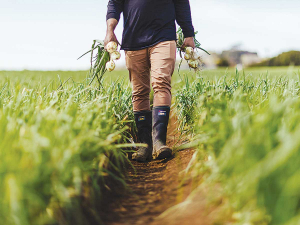EPA remains committed to deliver improved outcomes
OPINION: At the end of my first year as chair of the Environmental Protection Authority (EPA), I have been reflecting on the progress made in the time I have been in the role.
 Moves to introduce strict new regulations to protect highly productive land used for growing vegetables and fruit has been welcomed.
Moves to introduce strict new regulations to protect highly productive land used for growing vegetables and fruit has been welcomed.
The horticulture sector is praising the Government's moves to introduce strict new regulations to protect highly productive land used for growing vegetables and fruit.
HortNZ chair Barry O'Neil says the sector is pleased with the plans and it is something it had been advocating for some time. He believes the new regulations will protect highly productive land for this and future generations.
During the past 20 years, about 35,000 hectares of highly productive land has been carved up for urban or rural residential developent, while 170,000 hectares has been converted to lifestyle blocks.
The new regulations are enshrined in a document called the National Policy Statement for Highly Productive Land (NPS-HPL). The objective is to enhance protection for NZ's most productive land and providing security for both our domestic food supply and primary exports.
Environment Minister David Parker claims the NPS will greatly improve how NZ protects highly productive land from inappropriate subdivision, use and development.
"We need to house our people and to feed them too. Our cities and towns need to grow but not at the expense of the land that's best suited to grow our food," he says. "This NPS will help protect our best growing areas so Kiwis will continue to have access to leafy greens and other healthy foods."
Parker says councils will be required to identify, map and manage highly productive land to ensure it's available for growing vegetables, fruit and other primary production, now and into the future.
Agriculture Minister Damien O'Connor says once land is built on, it can no longer be used to grow food and fibre.
"That's why we are moving to protect our most fertile and versatile land, especially in our main food production areas like Auckland, Waikato, Hawke's Bay, Horowhenua and Canterbury."
Not Too Late
Advocating for governments to act in regard to protecting highly productive soils has been going on for some time, O'Neil says it's not too late and should result in protecting land in major fruit and vegetable growing areas.
Some local authorities have been strongly criticised for not doing enough to stop productive land going into housing or lifestyle blocks. O'Neil believes the NPS will clear up any doubts about what they have to do.
"I think local government has been reaching out for direction like this for some time so I believe they will welcome this," he told Rural News.
While the new rules cover all highly productive land, O'Neil says protecting vegetable growing land is the absolute priority.
"If we can't protect our vegetable growing locations we will end up importing frozen vegetables from countries offshore," he says. "While more pressing in the vegetable space, it also impacts on fruit production as well," O'Neil points to the Heretaunga Plains in Hawke's Bay where a significant amount of land has been lost from fruit production. In Bay of Plenty areas such Omokoroa are now just about all housing - with the kiwifruit production area moved to tar seal and concrete.
O'Neil adds it's not only urban sprawl that has taken highly productive land - lifestyle blocks are also an issue. He says often the problem starts with lifestyle blocks which then progresses to high density housing.
Coming in at a year-end total at 3088 units, a rise of around 10% over the 2806 total for 2024, the signs are that the New Zealand farm machinery industry is turning the corner after a difficult couple of years.
New Zealand's animal health industry has a new tool addressing a long-standing sustainability issue.
The Government has announced that ACC will be a sponsor of this year's FMG Young Farmer of the Year competition.
As veterinary student numbers grow to help address New Zealand's national workforce shortge, Massey University's School of Veterinary Science is inviting more veterinary practices to partner in training the next generation of vets.
South Island dairy farmers will soon be able to supply organic milk to Fonterra.
Norwood has announced the opening of a new Tasman dealership at Richmond near Nelson next month.

OPINION: Meanwhile, red blooded Northland politician Matua Shane Jones has provided one of the most telling quotes of the year…
OPINION: This old mutt has been around for a few years now and it seems these ‘once in 100-year’ weather…